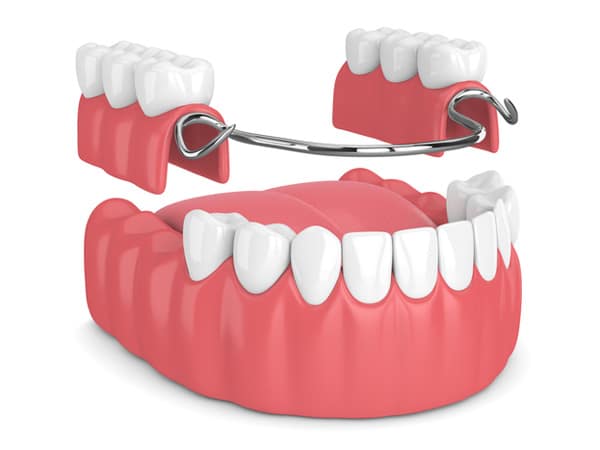Dentures - Complete and Partial
Henderson, NV
Dentures are one option for mouth restoration after you have lost all or a section of your teeth. Dentures are removable teeth that fit over gums as replacements for missing teeth.
These prosthetic devices are supported by soft and hard tissues of the oral cavity and can restore facial symmetry by filling the gap left by one or more missing teeth.
There are a few different reasons why you may have experienced tooth loss. No matter what the reason is, though, dentures can be used to restore the look and function of your mouth. Dentures can be either complete or partial and there are also several more specific types of dentures that you can get.
Complete Vs. Partial
Complete dentures are used for people who have lost all of their teeth. These are often seen in elderly patients but can be used for all ages. These allow patients to regain their ability to chew normally. You may notice some differences in the way you speak, but most people adapt to this over time. Complete dentures are totally customized to individual patients.
Partial dentures are used when patients have a section of missing teeth, rather than all of their teeth being lost. Partial dentures can be either fixed or removable. Fixed partial dentures are supported with dental implants that provide a strong and durable false tooth structure. Removable partial dentures have a plastic base that resembles your gum and a metal framework for support.
Denture Types
There are several other types of dentures as well, including implant-retained and immediate. Implant-retained dentures come in two styles; ball or locator attachment and bar attachment. Ball or locator attachments replace your permanent lower teeth. Bar attachments support false teeth in your lower jaw.
Immediate dentures, unlike all of the other types of dentures, are received on the same day that your teeth are extracted. Any other type of denture would take between six and eight weeks. There are both conventional and interim immediate dentures. Conventional immediate dentures are very similar in build to traditional dentures, but they are made for immediate placement. Interim immediate dentures are less durable, but they are only meant to be used as a temporary solution while you wait on more permanent dentures.
Denture Maintenance
Despite having missing teeth, oral hygiene is still critically important. Gum infections and other dental diseases can still occur even if you do not have all or any of your teeth. To clean your gums, use a soft toothbrush or washcloth to wipe the gums twice daily. You should also use a mouthwash twice daily for a minute each time. Of course, if you only received partial dentures, you can still clean your natural teeth in the typical fashion. This includes brushing twice daily using a fluoride-based toothpaste and flossing once daily.
Dirty dentures can also cause a number of health issues. To clean your dentures, wash them in soap and lukewarm water daily. You can use a soft denture brush or a washcloth to do so. In addition, when not wearing them, make sure they are kept in a denture solution. Our dentist may also recommend soaking in a white vinegar on occasion to remove any calculus build-up.
For more information on dentures, contact Joshua M. Ignatowicz DMD & Associates at 702-473-5100 today.
Dentures FAQs
What Are Dentures Made Of?
Dentures used to be made from plastic or porcelain, making them susceptible to chipping and breaking. Modern dentures are made of a hard resin and are longer-lasting than older variants. Resin is not synonymous with strength. The resin-made dentures can chip and break too, and wear down after extended usage.
The denture's supporting structure, which holds the artificial teeth and mimics the natural gum line, is made of the same resin used for the denture or a flexible polymer material that allows it to sit snugly against the gum line.
How To Clean Dentures
How Long Do Dentures Last?
Can You Sleep With Dentures?
Sleeping while wearing dentures is not recommended and causes health issues brought about by the accumulation of bacteria. They can get damaged and dislodged and tire the gums from prolonged wear.
Take them out at night, wash and clean them, and submerge them in warm water to keep them moist. Dried-out dentures can become misshapen.
Can Dentures Be Fitted To Receding Gums?
How Long Does It Take To Get Dentures?
Getting dentures is a lengthy procedure and might take between six weeks to three months. The timeline depends on the number of required steps before fitting the dentures. The timeline can significantly increase if a patient requires tooth extraction, gum grafting, or other dental procedures before being fitted for the dentures. The number of teeth requiring replacement also adds to the time.
Full and partial dentures also require different times.
